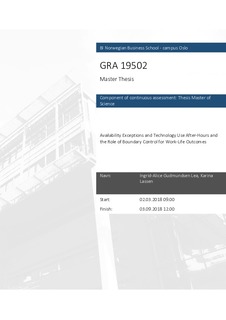| dc.contributor.author | Lea, Ingrid-Alice Gudmundsen | |
| dc.contributor.author | Lassen, Karina | |
| dc.date.accessioned | 2019-01-03T14:25:04Z | |
| dc.date.available | 2019-01-03T14:25:04Z | |
| dc.date.issued | 2018 | |
| dc.identifier.uri | http://hdl.handle.net/11250/2579045 | |
| dc.description | Masteroppgave(MSc) in Master of Science in Leadership and Organizational Psychology - Handelshøyskolen BI, 2018 | nb_NO |
| dc.description.abstract | Advancements in communication technology have led to a more boundaryless
relationship between work and non-work life for contemporary workers.
Technology use after-hours proposes a flexibility-paradox, where workers are
granted with flexibility to perform work at their own convenience, but at the same
time feel a constant pressure to be connected to the workplace. The individual’s
perceived control over work-life boundaries had been argued to determine
whether technology use after-hours will be negatively or positively related to
work-life outcomes. This thesis explores in particular the role of perceived
boundary control in the relationship between work connectivity behavior afterhours,
respectively, and job satisfaction, turnover intention, relaxation, and
psychological detachment. Data has been collected from three Norwegian
organizations through a self-completion questionnaire distributed in two waves.
The analyses are based on data from 67 respondents. The results of this study
found that when individuals feel that they have low control over work-life
boundaries, they have lower job satisfaction, higher turnover intention, and are
less able to psychologically detach from work than do individuals with high
perceived boundary control. The results also indicate that individuals who
frequently use technology after-hours find it harder to psychologically detach
from work. | nb_NO |
| dc.language.iso | eng | nb_NO |
| dc.publisher | Handelshøyskolen BI | nb_NO |
| dc.subject | ledelse | nb_NO |
| dc.subject | organisasjonspsykologi | nb_NO |
| dc.subject | leadership | nb_NO |
| dc.subject | organizational psychology | nb_NO |
| dc.title | Availability Exceptions and Technology Use After-Hours and the Role of Boundary Control for Work-Life Outcomes | nb_NO |
| dc.type | Master thesis | nb_NO |
